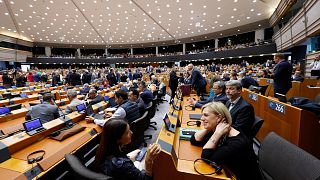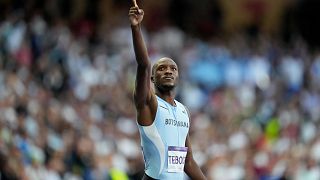Botswana
Voters in Botswana voted on Wednesday (October 23) in crucial general elections in one of Africa’s most stable democracies.
Over 900,000 registered voters were expected to cast their ballots across the country to elect members of the national assembly and by extension the president of the southern African nation.
The government declared October 23 – 25 as public holidays to allow for full participation of citizens in the democratic process.
The vote caps a busy election year for the southern Africa region which has witnessed elections in South Africa, Malawi, DR Congo and earlier this month in Mozambique.
In this article, we will keep track of the voting and tallying process, until the official results are declared.
- BDP wins election: Chief Justice
- Independent collation of results – 29% counted
- Why ex-president Khama voted for opposition
- Key players vote, address supporters
- Polls open
- High-stakes poll
Masisi’s party wins
he ruling Botswana Democratic Party (BDP) has won the general election after securing 29 national assembly seats, representing 51% of the vote, the chief justice announced on Friday.
Botswana voted on Wednesday to elect 57 national assembly and 490 local government representatives, with the candidate of the winning party set to become president.
“Although vote counting is still ongoing, the numbers of parliament seats attained so far by the BDP obliges me to declare Mokgweetsi Masisi as the elected president of Botswana,” said Chief Justice Terrence Rannowane.
The main opposition, the Umbrella for Democratic Change (UDC), secured 13 seats while the Botswana Patriotic Front won three and the Alliance for Progressive only one, with 73% of the voting districts counted so far.
Results collation by private media outlet
Privately-owned outlet, The Voice, has been collating results from the October 23 vote. As widely expected, the ruling Botswana Democratic Party, BDP, have taken a big lead with about a third of votes counted.
As at midnight of Thursday (October 24), four parties had secured seats in parliament. BDP, Umbrella for Democratic Change (UDC) coalition, Botswana Patriotic Front (BPF) and the Alliance for Progressives (AP).
Percentage of votes counted: 29%
Total number of votes: 263, 730
Total registered voters: 924, 709
- BDP = 16 constituencies = 124, 786 votes
- UDC = 5 = 90, 692
- BPF = 2 = 21, 757
- AP = 1 = 16, 812
According to the Independent Electoral Commission, IEC, the winner is declared once a party attains 29 parliamentary seats – the minimum requirement to form a government.
The government’s Twitter handle has also been posting updates on the constituency results as they trickle in. See more here
Why I voted for opposition: Khama
Ex-president Ina Khama on Wednesday revealed he had voted for the newly formed opposition party, the Botswana Patriotic Front (BPF).
In an interview with South African news portal, Eyewitness News, Khama said he voted for BPF because he is extremely disappointed in the ruling Botswana Democratic Party (BDP).
“I voted for the Botswana Patriotic Front, both parliament and council,” Khama said.
“We’ve just seen somebody who became drunk on power, falling into that power trap that we’ve seen happen in other African countries.’‘
President Mokgweetsi Masisi was Khama’s vice president, and succeeded him last year. The two have since fallen out as Masisi has reversed some of Khama’s key policies and prosecuted his allies implicated in corruption scandals.
Masisi, Boko hope for victory
Masisi is standing on his record on tackling corruption, such as making a declaration of assets obligatory for public sector officials, and slashing bureaucracy for small businesses.
“We are going to … tackle the challenges that the country is facing … improving the value chain of our national products whether it’s in tourism or minerals,” Masisi said after voting in his home village of Moshupa.
“This will help us achieve our goal of migrating towards a high-income country.”
Duma Boko, the main opposition challenger, who is also backed by former president Ian Khama, voted in the capital Gaborone.
“I hope the people of Botswana … will rewrite the history of this country, will write a different script for the economy,” Boko said after voting. “It is an epic moment.”
In the run up to the poll, Boko warned he would reject any results tainted by fraud, raising the spectre that Botswana, which has only known one-sided elections, could witness its first rancorous dispute over a tight result.
Key players vote
Former President Ian Khama casting his vote at Makolojwane Ward in Serowe. #BotswanaElections (Weekend Post) pic.twitter.com/y6PGmifKe6
— Sibs Macd (@SibsMacd) October 23, 2019
RT
PolokoTau: #BotswanaElections UDC leader DumaBoko speaks after voting in Gaborone pic.twitter.com/IgZalapKL0— City Press (@City_Press) October 23, 2019
#BotswanaElections AP presidential hopeful
ndabagaolathecasting his vote in Gaborone pic.twitter.com/dpsLdygWua— Poloko Tau (@PolokoTau) October 23, 2019
Polls open
Botswana polls opened on Wednesday at 6:30 a.m. (0430 GMT) for a general election that is expected to provide the first genuine challenge to the ruling Botswana Democratic Party (BDP) in its five decades of dominance.
Of Botswana’s population of 2.2 million people, 924,000 registered voters will elect 57 national assembly and 490 local government representatives.Polls close at 7 p.m.
Campaigning on promises to drive that economic transformation, Duma Boko, leader of the Umbrella for Democratic Change, is hoping to unseat the BDP of President Mokgweetsi Masisi. He is backed by former president Ian Khama, who handed over to Masisi last year but has since fallen into a bitter power struggle with him.
“We remain resolute and confident that we are going to win this election,” Boko told a news conference on Monday night before warning of possible fraud.
“I can only accept the result if the election is free and credible,” he added, raising the spectre that Botswana, which has only known one-sided elections, could witness its first rancorous dispute over a tight result.
The main concerns for the Batswana are unemployment hovering at around 20% and stark inequalities despite equitable state spending on health and education. To tackle either, the winner will need to do more to diversify the economy.
Mbakisi Gopolang, 25, waiting in line to cast his vote at a primary school in the capital Gaborone, said he was disappointed by the last decade under the governing BDP.
“The last ten years have been regressive, so I don’t want continuation of that. I am voting for a party that will drive economic growth, empower citizens and get rid of corruption and bring about transparency.”
Unprecedented polls
The polls have been described by analysts as unprecedented especially against the backdrop that the former president Ian Khama has thrown his weight behind two opposition presidential candidates.
All you need to know: Botswana’s crucial October 2019 polls
The Presidential bid will see President Eric Mokgweetsi Masisi battle it out with three other candidates.
PRESIDENTIAL DEBATE
Ndaba Gaolathe: Alliance for Progressives
Dr Mokgweetsi Masisi : Botswana Democratic Party
Biggie Butale: Botswana Patriotic Front
Duma Boko : Umbrella for Democratic Changewatch the debate on the link below#Presidentialdebatehttps://t.co/lGpsEuonYQ
— Botswana Government (@BWGovernment) October 16, 2019
In the first few weeks of his mandate (April 2018), President Masisi dissociated himself from the legacy of his predecessor by denouncing and lifting the ban on hunting wild elephants.
The move and other policy positions led to cracks within the ruling party, a situation that analysts say could swing favour to the main opposition Umbrella for Democratic Change.
According to the opposition group, the ruling Botswana Democratic Party, has been in power for too long, and has not done enough to transform people’s lives.
Past reports point to the country’s vast diamond resources, facilitated access to free education and health.
The country has attempted to diversify its sources of economic growth from mining to banking and tourism, but unemployment remains at 20%.
Voters will therefore have to choose candidates of the party they believe can address unemployment, inequality and excessive dependence on missing diamonds.
The party that will have the largest number of elected representatives out of the 57 seats to be filled in the parliament, will choose the president. Results are expected in the coming days.













01:13
Voter turnout in Togo's municipal elections overall low
01:21
Cameroon 2025: Maurice Kamto seeks to vie on a different political outlook
02:11
Witchcraft and politics: Uganda’s election season sparks supernatural surge
01:52
Togo’s security forces cast early votes ahead of high-stakes municipal elections
01:13
Forty years and counting: CAR once again postpones local elections
01:08
Dancehall superstar Shatta Wale urges young people to back President Mahama